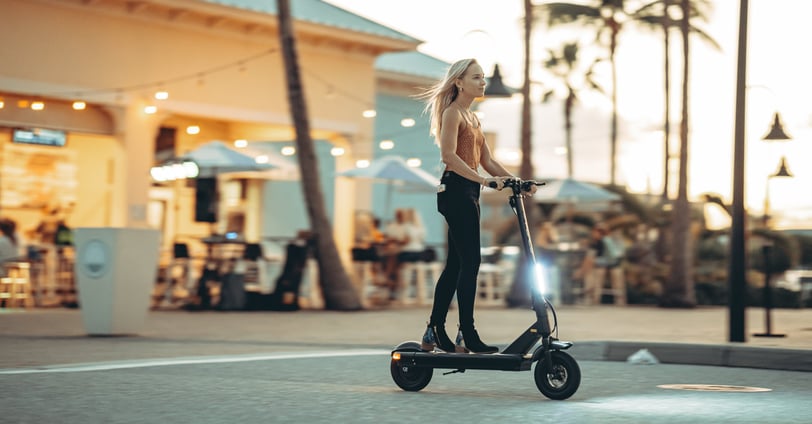Rolling On: E-scooters Secure Their Place on New Zealand's Streets
The Waka Kotahi New Zealand Transport Agency has renewed the exemption for e-scooters to operate on public roads, cycle lanes, and footpaths for an additional five years. This decision comes after comprehensive public consultation and evaluation of e-scooters' contribution to a safe and efficient transportation system. While safety concerns have been raised, the actual scale of accidents has been overblown, and measures such as GPS-enforced speed limits and designated parking zones have been implemented to address these concerns. E-scooters have not only provided a convenient and environmentally friendly mode of transportation but have also had a positive economic impact by driving foot traffic and supporting local businesses.
8/9/20233 min read


Rolling On: E-scooters Secure Their Place on New Zealand's Streets
Introduction
E-scooters, a fixture of New Zealand's cityscapes, have woven themselves into the fabric of how Kiwis navigate their urban environments. Bearing the weight of convenience and the promise of a sustainable transport solution, these agile vehicles seemed poised at the edge of an uncertain future. The pivotal question remained: Would Waka Kotahi New Zealand Transport Agency give e-scooters a red light, halting their presence on public roads, cycle lanes, and footpaths, essentially confining them to private property? As stakeholders and riders held their collective breath, the decision has thankfully rolled in favour of the status quo, granting e-scooters a continued role in shaping the nation's modern commute.
The History of E-scooter Regulation
The e-scooter journey in New Zealand began with a stroke of regulatory grace, as Waka Kotahi NZ Transport Agency carved out a niche for these electric vehicles to operate without the stringent classification of motor vehicles. This decision, set against the backdrop of burgeoning micro-mobility trends, effectively skirted the cumbersome processes of registration and licensing. As the September 2023 deadline loomed, the potential expiration of this exemption threatened to relegate e-scooters to private property and designated areas like skateparks, an outcome that would strike at the very heart of their utility in public transportation.
The Verdict by Waka Kotahi
It's a green signal for e-scooters as Waka Kotahi delivers its long-awaited verdict. Cementing the place of these nimble commuters on New Zealand's roads and pathways, the agency has renewed the exemption for an additional five years ahead of the deadline. This decision was informed by comprehensive public consultation and a keen evaluation of e-scooters' contribution to an efficient and safe land transport system. Amidst the deliberations, Waka Kotahi recognized the growing utilization of e-scooters for transport and their high user satisfaction rates, alongside acknowledging their potential to cut emissions and bolster the country's environmental objectives.
Addressing Safety and Public Concerns
While e-scooters have been embraced for their environmental and convenience benefits, safety concerns have been a persistent backdrop. Initial reports painted a troubling picture with a surge in accidents, stirring Auckland Council to temporarily yank Lime e-scooters off the streets in 2019. The ensuing introduction of GPS-enforced speed limits, designated parking zones, and a reduction in scooter numbers under council licenses has helped to temper the discourse. It has emerged, though, that even at the peak of concern, the actual scale of accidents was overblown. The Accident Compensation Corporation (ACC) revealed an overstatement of e-scooter claims by approximately $5 million, with mopeds and mobility scooters mistakenly conflated in earlier statistics. Waka Kotahi has welcomed the e-scooter operators' advanced safety features and is looking to implement further improvements such as stricter speed limits in pedestrian-dense zones.
Economic and Environmental Impacts
E-scooters aren't just zooming past urban landscapes; they are powering local economies and adding a vibrant thread to New Zealand's green tapestry. Beam, a prominent e-bike and e-scooter operator, underscores the beneficial ripple effect of these trips. Data suggests that approximately 40% of e-scooter journeys cater to commuting, whether for work or errands. Moreover, a staggering sixty percent of these rides culminate in a purchase at a local business, highlighting how micro-mobility can drive foot traffic and inject vitality into communities. With the environment in mind, Waka Kotahi's decision resonates with an ambition for reduced carbon footprints, aligning with New Zealand's broader goals of sustainability and ecological stewardship.
Perspectives from E-Scooter Operators
Representatives from e-scooter operational firms, like Beam, are vocal about the positive outcomes of Waka Kotahi's endorsement. Tom Cooper, the General Manager for Beam in Australia and New Zealand, praises the shared micro-mobility's invaluable contribution to urban centers, framing e-scooters as a safe, sustainable, and economical traversal option. Further into the future, Cooper anticipates fruitful collaborations with Waka Kotahi, local councils, and city stakeholders. This synergy is predicted to drive innovation and the adoption of new micro-mobility technology, ensuring that e-scooters continue to evolve as a crucial element in New Zealand's transportation fabric.
